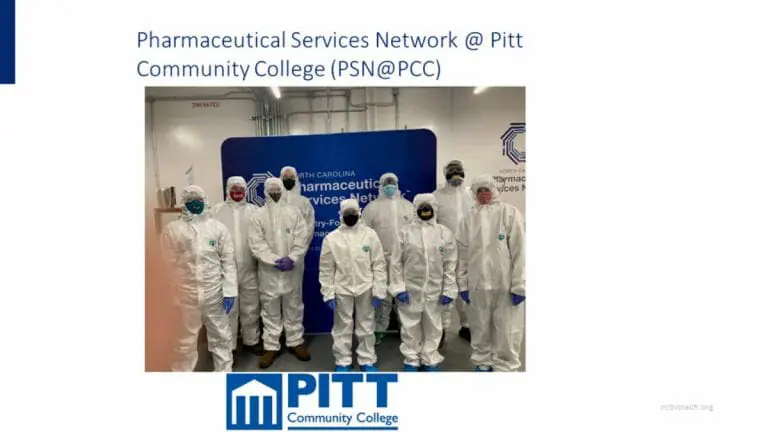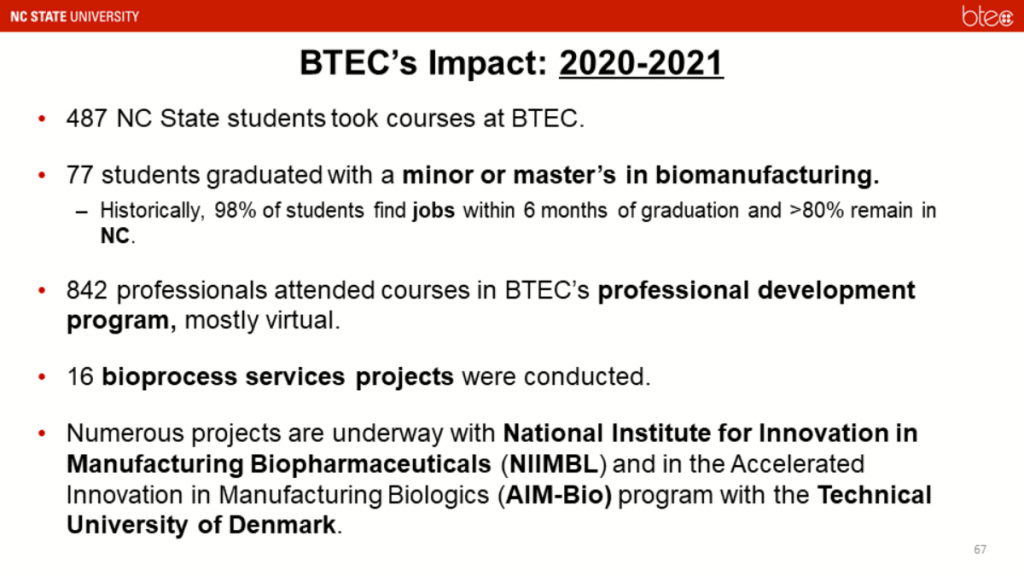NC colleges and universities review workforce training programs with BMF members
Representatives from the NC Community Colleges’ BioNetwork, the NC Pharmaceutical Services Network, BRITE at NC Central University, NC A&T University and North Carolina State University’s BTEC were all on hand Tuesday, Nov. 16, at the NCBIO Biotech Manufacturers Forum Meeting to discuss their efforts provide biomanufacturers with a skilled workforce and the state’s citizens with access to high quality positions in the industry.
The presentations were recorded and can be watched here.

NC Community Colleges BioNetwork
BioNetwork was represented by Bruce Mack, Ed.D., vice president of economic development for the NC Community Colleges System; Emily Sisk, executive director of NC BioNetwork; Vernon Shoaf, senior director of the BioNetwork Learning Solutions Team; and Leslie Isenhour, director of the BioNetwork Capstone Center and department head of biotechnology programs at Wake Technical Community College.
Mack said that the NC Community Colleges System is the third largest in the nation and offers 10 life sciences degree options in areas such as biopharmaceuticals, bioprocessing and agricultural and general biotechnology. BioNetwork is the life science training initiative of the NC Community Colleges System.
BioNetwork offers industry-driven-and-designed courses that include upstream and downstream processing, aseptic processing, industrial microbiology, micro-pipetting and validation. It also conducts STEM outreach and develops life sciences learning solutions, such as 3D simulations, augmented and virtual reality, electronic learning and career fairs. BioNetwork also offers a BioWork Process Technician Certification Program.
Isenhour told attendees about the BioNetwork Capstone Center that offers a hands-on simulated work environment located on NCSU’s Centennial Campus. New options are available at the new Wake Tech location in Morrisville that opened in October and another facility opening in eastern Wake County in 2024.

NC Pharmaceutical Services Network
Mike Renn, the principal instructor with the NC Pharmaceutical Services Network, talked about the NCPSN collaboration that includes East Carolina University and Pitt Community College. It provides a continuum of pharmaceutical education and training to new and existing companies in North Carolina and beyond.
Offerings include GMP/GLP courses, short courses and analytical services through ECU and a pilot-plant manufacturing environment and lab-scale equipment to teach oral solid dosage theory and manufacturing techniques at PCC. PSN partners locally with Thermo Fisher Scientific, Mayne Pharma and others in Greenville and Eastern North Carolina. These partnerships have led to innovative programs, such as one that brings Pitt County Schools and Thermo Fisher together to identify promising high school graduates who aren’t planning to continue their education and guiding them into a life sciences training program that ends with a job interview.
NC Central BRITE
The Biomanufacturing Research Institute and Technology Enterprise at NC Central University was represented by Hernán Navarro, Ph.D., BRITE’s director. BRITE comprises 52,000 square feet of labs, offices and classrooms and the Pharmaceutical Sciences Department at NCCU. The center has a capacity of about 200 students who are supported with internships and $200,000 in scholarships.
BRITE received a four-year $1.85 million grant from the GSK Foundation that will provide two-week summer immersion experiences for 48 high school students a year. The grant also provides financial support and resources for students and professional development for community college students and faculty.
Navarro said BRITE has increased its focus on recruiting and building a pipeline into its BS in Pharmaceutical Sciences program. It is also offering more options for students, including bachelor’s, master’s and doctoral degrees in pharmaceutical sciences, along with a minor and a certificate. A bachelor’s degree, minor and certificate in clinical research studies are also available.
CEPDAM at NC A&T
NC Agricultural and Technical State University boasts the Center for Excellence in Product Design and Advanced Manufacturing. The center is organized around five clusters, one of which is dedicated to bio, agro and environmental systems manufacturing. Joining the BMF meeting on behalf of NC A&T were University Distinguished Professor Salil Desai, Ph.D., director of CEPDAM; Professor Stephen Knisley, Ph.D., chair of the Department of Chemical, Biological and Bioengineering; and Associate Professor Checo Rorie, Ph.D., chair of the Department of Biology.
A&T offers a bachelor’s and master’s degrees in bioengineering and chemical engineering. Of the 319 students enrolled, 86% are underrepresented minorities and 62% are women.
BTEC at NCSU
The Biomanufacturing Training and Education Center at North Carolina State University closed out the day’s presentations. BTEC student learn all aspects of biomanufacturing processes, including equipment and utilities involved, cGMP and regulatory issues, process design, protein therapeutics, vaccines, gene and cell therapy and more, said Gary Gilleski, Ph.D., BTEC’s executive director.
BTEC has a 77,000 square foot simulated GMP facility and produced 77 students with a minor or master’s in biomanufacturing last year. BTEC continues to recruit heavily through its virtual career fairs, which have allowed increased participation by both employers and candidates. Its most recent fair in October attracted 166 students and 28 companies. The next event is in February.



